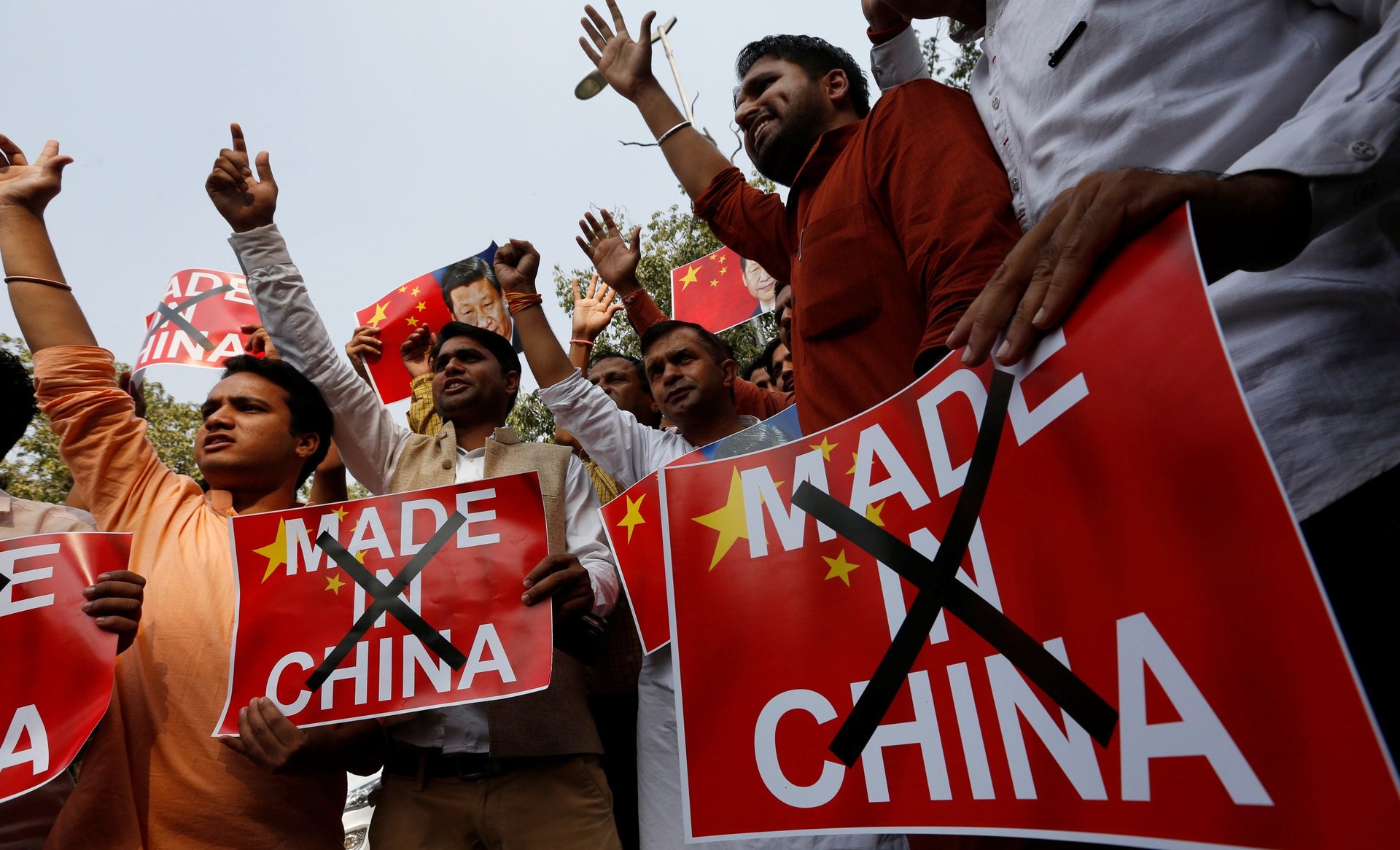If India does #BoycottChina, its startups will lose more than just funding
The growing anti-China sentiment could cost Indian startups dearly.


The growing anti-China sentiment could cost Indian startups dearly.
The phenomenal growth of India’s much-celebrated tech startup ecosystem, which is now the third-largest in the world, could be stunted if Chinese funding into the country slows in the aftermath of the military escalations on the border this week, experts believe.
“Chinese investors have been making their presence stronger in the Indian startup ecosystem since (the) last few years, which also enabled these startups to scale up successfully,” said Aurojyoti Bose, lead analyst at GlobalData. Now such companies “are in a state of uncertainty for capital raising.”
China-made money
Last year, Chinese investors put a whopping $3.9 billion (Rs29,729 crore) into Indian startups—nearly double the $2 billion in 2018. Over 90 Indian startups received Chinese funding in 2019.
Eighteen of the 30 Indian unicorns are backed by Chinese investors, a Gateway House report (pdf) noted, adding that “China is embedded in Indian society, the economy, and the technology ecosystem that influences it.”
“Every source of funding loss can be a problem to the broader startup ecosystem,” said Yugal Joshi, vice-president of Texas-based consultancy Everest Group. “The mature ones (startups) will do fine, but the early stage may struggle.”
Besides the money, Chinese investors like Alibaba and Tencent, bring to the table their experience of scaling businesses, which is a challenge for Indian entrepreneurs as the internet economy in the country is still nascent.
They “offer practical advice to scale business mostly having done that in the Chinese market,” Joshi said. “They are aggressive in their risk-taking and can push the firm to drive scale quickly.”
Indian hotels group Oyo is an example of how a Chinese-backer can push a company to scale fast. Oyo, backed by the China Lodging group, is among a handful of Indian tech startups that have ventured outside the country. The company has reportedly become the largest hotel chain in China with around 500,000 rooms in 337 cities. (It’s another story that the Covid-19 crisis has caused it to lose massive ground in recent months.)
So far, Chinese investors seem to be committed to their promises in India.
Chinese investors who are in it for the long-haul “should not be flustered by these events,” Ntasha Berry, co-founder of Venture Gurukool, which helps Indian startups reach out to Chinese investors, told MoneyControl. “We expect deal momentum to continue but in the immediate future, both investors and founders will adopt a cautious approach.”
But #BoycottChina, which has been trending on Indian social media for several days now, could play spoilsport.
#ChineseProductsInDustbin
Since the Ladakh face-off between the neighbouring countries killed 20 Indian soldiers, Twitterati has been calling to #BoycottChina and to throw #ChineseProductsInDustbin.
Even before the recent border face-off, the belief that China was the cause of the Covid-19 pandemic had started making Indians call for a boycott of Chinese products. The opposition was so fierce that an app, called Mitron, gained overnight popularity in India as it helped users identify which of the software on their devices was made in China, so those could be uninstalled. Later, Google took down the Mitron app.
There have also been calls to shun Chinese phone makers like Xiaomi, Realme, Oppo, Vivo, and others. Ironically, these are the best-selling brands in the country and hold a majority of the market share in the world’s second-largest smartphone market.
Consequently, domestic startups that have Chinese investors began facing wrath, too.
The Indian government, too, has taken steps that could hurt the country’s relationship with China. In April, India amended the rules for foreign direct investment (FDI) from bordering nations, including China, to protect domestic startups from hostile takeovers as the Covid-19 pandemic broke out.
A spread of investors
Experts are now advising Indian startups to have a mix of investors and lower dependence on backers from a single country. ”The investment scouting arm of startups needs to redistribute their efforts around newer investor partners,” said Bose of GlobalData.
The options Indian startups have includes Japanese investors, such as Softbank, which has been backing a host of young companies in the country. Another hope is South Africa’s Naspers, which has been broadening its portfolio in the region. American investors, too, continue to back the India ecosystem.
But there are challenges to this given that “investors are more choosy and may be holding on to cash than invest fearing the startup may go out of business” during the pandemic, Bose said.
The US and European economies continue to reel under the impact of Covid-19 and investments from these regions are likely to remain sluggish in the short-term. Plus, seeing India’s poor attempt and culling coronavirus cases, foreign investors are fleeing the market.